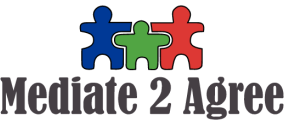Mediation-Arbitration or Med-Arb, is an approach that combines the benefits of both techniques. The sessions start with the parties trying to collaborate on an agreement with the help of the mediator, or the med-arbiter.
This process follows the usual mediation process, initial individual meetings, followed by sessions with both parties. The goal is to do everything possible to reach an amicable and workable agreement that everyone can embrace, support and in the case of children an agreement that focusses on their best interest.
If for some reason the parties are unable to reach a final agreement but have agreed on some of their issues, the mediator or med-arbiter then assumes the role of arbitrator (if qualified) and renders a binding decision, usually very quickly, on all the unresolved issues. If a different person is chosen to be the arbitrator in a med-arb case, he or she can take over all or part of the dispute from the mediator.
Statistically, most cases of med-arb turn into successful mediations with no requirement for arbitration. When that actually happens that’s great but in the cases where mediation was not successful then not so much.
Like any other alternative dispute resolution process there are advantages and disadvantages to med-arb.
Advantages:
– Cost and time effective: Sessions are based on the parties schedules and availability. They control the pace of the process it can be quick or slow it’s completely up to the parties to decide. No requirement to wait on court date availability. No need to re-start process if mediation fails, can continue with same med-arbiter who already knows the case.
– Decision making over final outcome: Parties can settle the dispute during mediation and be in full control of final outcome or can also decide to let 3rd party med-arbiter make the final decisions.
– Finality: Some parties opt for the arbitration side of med-arb as it provides finality. They know the med-arbiter has complete authority to create a final and binding settlement.
– Acts as a motivator: Parties know that if they don’t come to an agreement during the mediation sessions they will no longer be in a position to make decisions for themselves, their kids and families. That knowledge in itself often motivates parties to work harder in mediation in order to come to a mutually beneficial agreement.
Some people will tell you that med-arb is great and is much cheaper than court. Until you actually experience it you may believe that. Let me tell you that is often not the case as I unfortunately found out lately, when my best friend had to go through the process herself. First, make sure your lawyer explains to you the implications of entering a Med/arb Agreement before you agree and sign it. Here are some of the things my friend found out the hard way:
- Once you sign the Med/Arb Agreement it’s not that easy to get out of it. If mediation is unsuccessful you cannot say that you no longer want to arbitrate, in the majority of the cases you are now committed whether you want it or not.
- In my best friend’s case, the arbitrator also requested 3 post dated cheques of $25,000.00 each and also mentioned that these were only deposits that the arbitration could very well cost $200K.
- The opposing party can call upon as many witnesses as they want so the more witnesses the more time, days the more you pay your arbitrator, your lawyers etc.
- If you are dealing with a self-employed party, arbitration will not help you discover more than mediation did, if he/she hides his/her money well there is nothing the arbitrator can do.
- Do not go with an arbitrator that was chosen by the opposing party, try to get one that is not known by both party this will hopefully reduce all biases or conflict of interest.
The other main problem I see with Med/Arb is that it discourages honesty, openness, financial disclosure: If you know some of the information you may divulge during your mediation sessions may be used against you if the process moves to arbitration you may not be willing to be as forthcoming as you would in a pure mediation process. Parties may also agree to certain things they normally would not out of fear of losing even more in arbitration.
My advice or my recommendation is do everything you can to resolve your issues in mediation, draft your Parenting Plan, do your financial disclosure and calculate your Net Family property with your mediator, just these 3 things will save you tens of thousands of dollars in legal fees.
